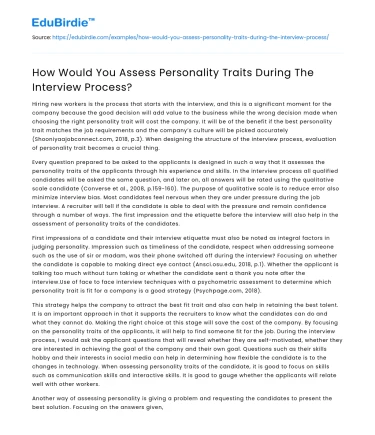Introduction
Assessing personality traits during the interview process is a critical component for organizations aiming to recruit candidates who not only possess the requisite technical skills but also align with the company's culture and values. Personality traits—defined as enduring patterns of thoughts, feelings, and behaviors—can significantly impact job performance, team dynamics, and organizational success. According to a study by Barrick and Mount (1991), certain personality dimensions, such as conscientiousness, are consistently correlated with job performance across various occupations. Therefore, integrating personality assessment into the interview process can aid in making informed hiring decisions. This essay explores effective techniques for assessing personality traits during interviews, evaluates the benefits and limitations of these methods, and discusses their role in enhancing the recruitment process.
Utilizing Structured Behavioral Interviews
Structured behavioral interviews are a widely adopted method for evaluating personality traits. This technique involves asking candidates standardized questions that elicit responses based on past behavior, which can provide insights into their personality. For instance, questions like "Can you describe a time when you had to overcome a significant challenge?" can reveal traits such as resilience and problem-solving ability. According to Judge et al. (2002), structured interviews are more reliable and valid than unstructured interviews because they minimize interviewer bias and improve the consistency of the evaluation process. Additionally, using a scoring rubric allows interviewers to objectively assess the candidate's responses, ensuring a fair comparison between candidates.
Save your time!
We can take care of your essay
- Proper editing and formatting
- Free revision, title page, and bibliography
- Flexible prices and money-back guarantee
However, structured behavioral interviews also have limitations. They rely heavily on the candidate's ability to recall relevant experiences and articulate them effectively, which may disadvantage individuals with less interview experience or those who are naturally reserved. Furthermore, this method assumes that past behavior is a reliable predictor of future behavior, which might not always hold true. To address these concerns, interviewers should consider supplementing structured behavioral interviews with other assessment tools, such as personality tests, to gain a holistic understanding of the candidate's personality.
Transitioning from structured interviews to the inclusion of psychometric assessments can further enhance the understanding of a candidate's personality. These assessments provide quantifiable data that can complement the qualitative insights gained from interviews, offering a more comprehensive view of the candidate's fit for the role and organization.
Incorporating Psychometric Assessments
Psychometric assessments, such as the Big Five Personality Test, offer a standardized method to evaluate a candidate's personality traits. These assessments measure five core dimensions: openness, conscientiousness, extraversion, agreeableness, and neuroticism, which are pivotal in predicting workplace behavior and performance. Research by Barrick and Mount (1991) supports the use of these assessments, highlighting the predictive validity of conscientiousness and emotional stability in job performance across various roles.
One advantage of psychometric assessments is their ability to provide objective and reliable data on a candidate's personality traits, reducing the subjectivity inherent in interviews. They can also highlight areas of potential development for candidates, aiding in their future growth within the organization. However, critics argue that psychometric tests may not capture the full complexity of human personality and are sometimes perceived as intrusive by candidates. To mitigate these concerns, it is crucial for organizations to ensure the tests are administered ethically and interpreted by trained professionals.
While psychometric assessments provide valuable insights, they should not be used in isolation. Combining them with interviews and other assessment methods creates a balanced approach that leverages the strengths of each method, enhancing the accuracy and fairness of the recruitment process.
Evaluating Cultural Fit and Interpersonal Skills
Assessing cultural fit and interpersonal skills during the interview process is essential for ensuring that new hires will thrive in the organization's environment. Cultural fit refers to the alignment between a candidate's values, beliefs, and behaviors with those of the organization. Methods such as situational judgment tests and group interviews can be effective in evaluating these aspects. For example, presenting candidates with hypothetical scenarios that reflect the company's values can reveal how they might navigate real workplace challenges.
Interpersonal skills, such as communication, teamwork, and empathy, are also crucial personality traits that contribute to an individual's success in a collaborative work setting. Techniques like role-playing exercises and peer interviews can be instrumental in assessing these skills. As noted by McClelland (1998), competencies related to emotional intelligence, such as self-awareness and social skills, are strong predictors of leadership and managerial effectiveness.
Nonetheless, focusing solely on cultural fit can inadvertently lead to homogenization, potentially stifling diversity and innovation within the organization. It is vital for interviewers to balance the assessment of cultural fit with a commitment to diversity and inclusivity, ensuring that the organization benefits from a wide range of perspectives and ideas.
Transitioning from the assessment of cultural fit and interpersonal skills, it is important to synthesize these insights with the data gathered from both interviews and psychometric assessments. This integrative approach ensures a comprehensive understanding of the candidate's potential to contribute positively to the organization.
Conclusion
In conclusion, assessing personality traits during the interview process is a multifaceted endeavor that requires a combination of methods to achieve the most accurate results. Structured behavioral interviews, psychometric assessments, and evaluations of cultural fit and interpersonal skills each offer unique insights into a candidate's personality. While each method has its strengths and limitations, their integration provides a holistic view that enhances the recruitment process. By adopting a comprehensive approach, organizations can make informed hiring decisions that align with their strategic goals and foster a diverse and dynamic workforce. As the nature of work continues to evolve, the importance of effectively assessing personality traits will only increase, underscoring the need for ongoing research and refinement of these assessment techniques.






 Stuck on your essay?
Stuck on your essay?

